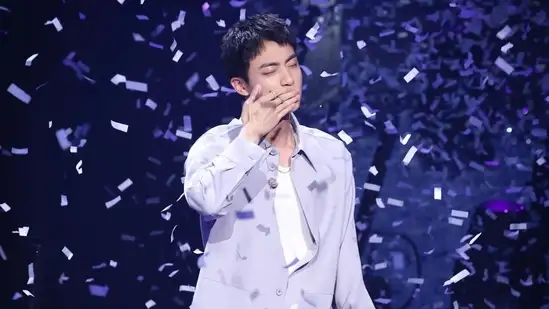BTS’ Jin Requests Respect for Personal Space After Unwanted Physical Contact at Fan Event
Jin, the oldest member of global K-pop sensation BTS, recently made a heartfelt appeal to fans, asking them not to touch or grab him during public appearances. This gentle request follows an incident in 2024, where two fans crossed personal boundaries by attempting to kiss him without consent at a fan meeting.

As one of the most recognized faces in K-pop, Jin has always been known for his warm interactions with fans. However, the incident highlighted the growing need to address boundaries in fan culture—especially when admiration turns into discomfort for the idols involved.
The 2024 Controversy: When Enthusiasm Went Too Far
In 2024, during an official fan interaction event, a concerning incident took place. Two attendees were seen trying to physically engage with Jin—reaching out to touch and even kiss him. Though he remained composed, Jin’s unease was noticeable. Videos from the event quickly went viral, sparking outrage among the BTS fandom, known as ARMY.
Fans across social media platforms condemned the behavior and emphasized the importance of consent and respect during such events. What should have been a joyful moment turned into a serious conversation about the limits of fan interactions.
Jin’s Calm Yet Firm Response in 2025
Appearing at a recent public gathering, Jin addressed the issue head-on. In a respectful tone, he asked supporters to refrain from physical contact. “I know you’re happy to see me and I truly appreciate your love,” he said. “But please don’t grab or touch me when I walk past.”
He went on to explain that feeling safe in fan environments is important not just for him, but for the continuation of such in-person interactions. His message wasn’t scolding—it was a sincere reminder that admiration should come with respect for personal space.
Redefining Idol-Fan Relationships
Jin’s statement speaks volumes about the evolving nature of idol-fan connections. In the world of K-pop, where artists often share deeply personal content with their audience, fans sometimes develop a sense of closeness that blurs emotional boundaries. While most followers understand the limits, a few might act on that perceived intimacy inappropriately.
These moments can have real consequences. Not only do they make artists uncomfortable, but they can also lead to stricter fan engagement rules, reducing opportunities for genuine, healthy interactions.
Parasocial Attachments: Where Affection Crosses the Line
The situation sheds light on what’s known as parasocial relationships—where fans form emotional bonds with public figures who don’t know them personally. This phenomenon is especially common in the K-pop world, where idols frequently post personal messages, behind-the-scenes clips, and livestreams.
While these connections can be positive, offering fans comfort and motivation, they can also become problematic when individuals forget that their idols are real people with boundaries.
Dr. Eun-Ji Park, a media psychologist in Seoul, notes: “Celebrities are often seen as approachable because of how much they share. But that openness doesn’t give fans the right to ignore personal limits.”
Fans Show Their Support for Jin
In the wake of his statement, fans around the world responded with understanding and encouragement. Hashtags like #ProtectJin and #RespectJin trended across platforms, with many ARMYs pledging to always honor his boundaries.
Fan communities also began sharing guidelines on proper behavior at events, reminding each other that supporting idols includes protecting their comfort and well-being.
This overwhelming show of solidarity is a testament to the strength of BTS’ fandom. Rather than reacting defensively, most fans acknowledged the importance of Jin’s message and took it to heart.
What This Means for the K-pop Industry
Jin’s experience is not isolated—many idols face similar challenges during public appearances. As K-pop continues to grow on a global scale, industry professionals are increasingly focusing on artist safety during fan events.
Some entertainment agencies have already implemented “no contact” policies and established clearer rules for meet-and-greet sessions. Others are exploring legal measures to address extreme or inappropriate fan behavior.
These steps, combined with open communication like Jin’s, could pave the way for healthier fan-idol dynamics in the future.
A Needed Conversation
At its core, Jin’s recent request isn’t about creating distance—it’s about reinforcing mutual respect. Fans admire idols for their talent, dedication, and charisma, but that admiration must never override basic human decency.
Jin’s courage in addressing this sensitive topic sets a powerful example. It shows that artists shouldn’t have to choose between connecting with fans and protecting their personal space.
His words serve as a reminder that while love and excitement are central to fandoms, they must be expressed in respectful, non-invasive ways. After all, the most meaningful support a fan can offer is one that honors the person behind the performer.






